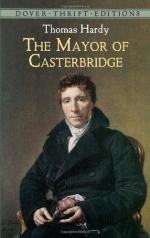Very often, as his hay-knife crunched down among the sweet-smelling grassy stems, he would survey mankind and say to himself: “Here and everywhere be folk dying before their time like frosted leaves, though wanted by their families, the country, and the world; while I, an outcast, an encumberer of the ground, wanted by nobody, and despised by all, live on against my will!”
He often kept an eager ear upon the conversation of those who passed along the road—not from a general curiosity by any means—but in the hope that among these travellers between Casterbridge and London some would, sooner or later, speak of the former place. The distance, however, was too great to lend much probability to his desire; and the highest result of his attention to wayside words was that he did indeed hear the name “Casterbridge” uttered one day by the driver of a road-waggon. Henchard ran to the gate of the field he worked in, and hailed the speaker, who was a stranger.
“Yes—I’ve come from there, maister,” he said, in answer to Henchard’s inquiry. “I trade up and down, ye know; though, what with this travelling without horses that’s getting so common, my work will soon be done.”
“Anything moving in the old place, mid I ask?”
“All the same as usual.”
“I’ve heard that Mr. Farfrae, the late mayor, is thinking of getting married. Now is that true or not?”
“I couldn’t say for the life o’ me. O no, I should think not.”
“But yes, John—you forget,” said a woman inside the waggon-tilt. “What were them packages we carr’d there at the beginning o’ the week? Surely they said a wedding was coming off soon—on Martin’s Day?”
The man declared he remembered nothing about it; and the waggon went on jangling over the hill.
Henchard was convinced that the woman’s memory served her well. The date was an extremely probable one, there being no reason for delay on either side. He might, for that matter, write and inquire of Elizabeth; but his instinct for sequestration had made the course difficult. Yet before he left her she had said that for him to be absent from her wedding was not as she wished it to be.
The remembrance would continually revive in him now that it was not Elizabeth and Farfrae who had driven him away from them, but his own haughty sense that his presence was no longer desired. He had assumed the return of Newson without absolute proof that the Captain meant to return; still less that Elizabeth-Jane would welcome him; and with no proof whatever that if he did return he would stay. What if he had been mistaken in his views; if there had been no necessity that his own absolute separation from her he loved should be involved in these untoward incidents? To make one more attempt to be near her: to go back, to see her, to plead his cause before her, to ask forgiveness for his fraud, to endeavour strenuously to hold his own in her love; it was worth the risk of repulse, ay, of life itself.




